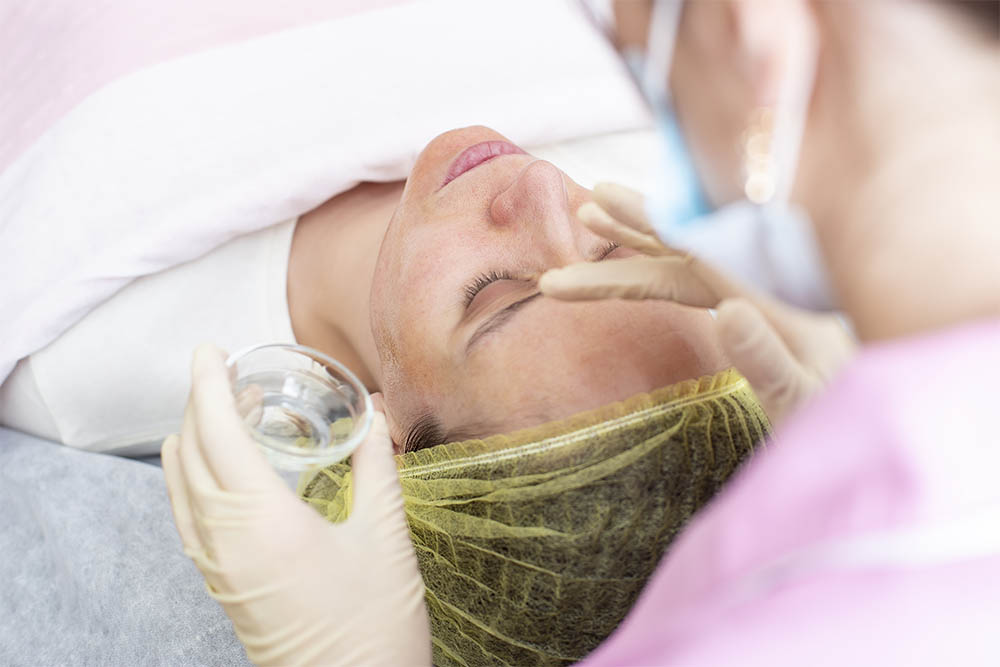Chemical Peels
chemical peels

Chemical peels :
A chemical peel uses a chemical solution to remove layers of skin, revealing the more youthful skin underneath. Chemical peels can reduce or improve fine lines and wrinkles, acne, scars, uneven skin color, and other skin imperfections. Different chemicals determine the depth of your peel and the type of skin condition treated.
A chemical peel, also known as chemexfoliation or derma peeling, uses a chemical solution to improve the appearance of your skin. In this treatment, a chemical solution is applied to your skin, which causes trauma or injury to your skin’s layers. The skin layers eventually peel off, revealing more youthful skin. The new skin is usually smoother with fewer lines and wrinkles, has a more even color, and is brighter in complexion.
Chemical peels are used to treat certain skin conditions or to improve your appearance by improving the tone and texture of your skin.
Chemical peels are most commonly performed on your face, neck or hands. They can help reduce or improve:
- Fine lines under your eyes or around your mouth and wrinkling caused by sun damage, aging and hereditary factors.
- Certain types of acne.
- Mild scarring.
- Sun spots, age spots, liver spots, freckles, uneven skin coloring.
- Precancerous scaly spots called actinic keratosis.
- Rough skin, scaly patches, dull complexion.
- Dark patches (melasma) due to pregnancy or taking birth control pills.
You will work with your dermatologist to determine the depth of your peel. This joint decision can vary depending upon the condition of your skin and the objectives of treatment.
Sags, bulges, deep scars, deep facial lines and more severe wrinkles don’t respond well to chemical peels. If these are your concerns, other cosmetic surgical procedures, such as carbon dioxide laser resurfacing, a face lift, brow lift, eye lift or soft tissue filler will be better options. A dermatologic surgeon can help determine the best treatment for your concerns.
Generally, superficial peels can be used on all skin types. However, if you have a darker skin tone, you have a greater risk of experiencing a darkening of your skin after treatment. This condition is called post-inflammatory hyperpigmentation. If you have a naturally darker skin tone, you may want to get the advice of your dermatologist about other less aggressive treatments to reduce the risk of hyperpigmentation.
Chemical peeling may also not be recommended if you:
- Have a history of abnormal skin scarring.
- Have extra colouring in your scars.
- Have skin conditions or take medications that make your skin more sensitive.
- Can’t stay out of the sun for the healing period.
A chemical peel can be performed in a doctor’s office or in a surgery center as an outpatient procedure. Your skin will be thoroughly cleansed with an agent that removes excess oils, while your eyes and hair are protected. A chemical solution is then applied to your skin. Chemical solutions typically used include glycolic acid, trichloroacetic acid, salicylic acid, lactic acid or carbolic acid (phenol). The different types of chemicals cause a controlled injury, each penetrating through to a different skin depth, then peeling away to reveal a new layer of skin.
The different chemical solutions provide different results. The choice of chemical depends on your goal. You will work with your dermatologist to determine the depth of your peel.
In certain skin types, there’s a risk of a temporary or permanent change in the colour of your skin. Taking birth control pills, pregnancy or a family history of brownish discolouration on your face may increase your risk of developing abnormal pigmentation.
There’s also a low risk of scarring in certain areas of your face and certain individuals may be more prone to scarring. If scarring does occur, it can usually be treated with good results.
If you’ve had a history of herpes outbreaks, there’s a small chance of reactivating the cold sore. Your dermatologist can prescribe medication to reduce the chance of a flare-up. Follow the instructions of your doctor.
Before your chemical peel, be sure to tell your dermatologist if you have a history of keloids (scar tissue overgrowth created at the site of a skin injury), any unusual scarring tendencies, any X-rays of your face or a history of cold sores.
Infections are rare but still a risk.

